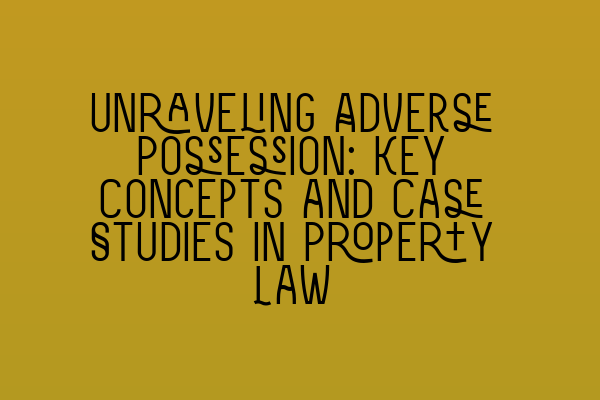Unraveling Adverse Possession: Key Concepts and Case Studies in Property Law
Welcome to SQE Property Law & Land Law, where we pride ourselves on providing expert legal advice and information. In this blog post, we will delve into the fascinating topic of adverse possession, exploring key concepts and real-life case studies to help you gain a thorough understanding of this area of property law.
Adverse possession, also known as squatters’ rights, is a legal doctrine that allows an individual to claim ownership of someone else’s land if certain conditions are met. The idea behind adverse possession is rooted in fairness and the notion that abandoned or neglected land should not remain unutilized. However, it is important to note that adverse possession is a complex area of law, with specific requirements that must be met for a successful claim.
Let’s begin our exploration of adverse possession by examining the key concepts involved. Four main elements must be established to prove adverse possession: open and notorious possession, actual possession, exclusive possession, and continuous possession.
Open and notorious possession refers to the occupier openly demonstrating their claim to the land, without any attempt to hide or conceal their occupation. Actual possession, on the other hand, requires the occupier to physically use and control the land, such as by erecting structures, cultivating crops, or maintaining the property in some way.
Exclusive possession demands that the occupier has exclusive control and enjoyment of the land, meaning that others are not allowed to use or access it without the occupier’s permission. Lastly, continuous possession requires the occupier to use and occupy the land without interruption for a specified period, which varies depending on the jurisdiction.
Now that we have covered the key elements of adverse possession, let’s delve into some real-life case studies to illustrate how these concepts apply in practice.
Case Study 1: Smith v Jones
In the case of Smith v Jones, Mr. Smith had been using a small portion of Mr. Jones’ land as a vegetable garden for over 20 years. Mr. Smith had openly and continuously cultivated the garden, using it exclusively for his personal benefit. The court ruled in favor of Mr. Smith, granting him ownership of the land through adverse possession. This case highlights the importance of open and notorious possession, as well as continuous and exclusive use.
Case Study 2: Brown v Green
In the case of Brown v Green, Mrs. Brown had built a fence around a disputed strip of land located between her property and Mr. Green’s property. Mrs. Brown had maintained the fence and used the land as an extension of her garden for over 12 years. Despite Mr. Green’s occasional complaints, Mrs. Brown continued to openly and exclusively possess the land. The court found in favor of Mrs. Brown, recognizing her claim to the land through adverse possession. This case emphasizes the significance of actual possession and exclusive control.
As mentioned earlier, adverse possession is a complex area of law, and the requirements for a successful claim can vary between jurisdictions. Therefore, it is crucial to consult with a qualified solicitor who specializes in property law to ensure you have a comprehensive understanding of the specific rules and regulations that apply in your area.
At SQE Property Law & Land Law, we offer a range of preparation courses for the SQE 1 and SQE 2 exams, as well as practice exam questions and mocks to help you succeed in your legal career. Visit our related articles for further information on these courses and upcoming exam dates:
– SQE 1 Practice Exam Questions
– SQE 1 Practice Mocks FLK1 FLK2
– SQE 2 Preparation Courses
– SQE 1 Preparation Courses
– SRA SQE Exam Dates
In conclusion, adverse possession is a fascinating yet intricate aspect of property law. Understanding the key concepts and reviewing real-life case studies will equip you with the knowledge to navigate this complex area. Remember to seek professional legal advice when dealing with adverse possession matters, and consider our preparation courses to enhance your legal career. Stay tuned for more informative blog posts from SQE Property Law & Land Law.
